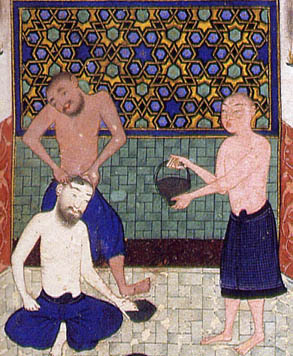
The Arab physician IbrÄhÄ«m ibn ‘Abd al-Rahman ibn AbÄ« al-Azraq, wrote an important medical text near the end of the 9th century A.H./fifteenth century C.E. This is his TashhÄ«l al-manÄfi‘ fÄ« al-á¹ibb wa-al-ḥikma, which was published in Cairo in the late 19th century and has been republished many times since then. One of his chapters deals with adhÄn, that is oils and lotions that were rubbed on the body either in the hot bath or just for general health. Here is my translation of his account on oils.
Section on the Benefit and Influence of Oils (adhÄn)
The Prophet, may Allah bless him and grant him salvation, said: “Eat olive oil (zayt) and rub it on the body.†It is a remedy for seventy illnesses, one of these being leprosy (judhÄm). He said: “For forty nights, Satan will not come near anyone who has olive oil applied.†Zayt is the extraction of the olive, according to al-DÄ«wÄn. Cold and wet, but said to be hot. It softens (yadbughu) the stomach, strengthens the body, energizes movement, and there is benefit for one in old age in applying it to the eyes against dimming of vision. According to Ibn ‘Amr the Prophet, may Allah bless him and grant him salvation, said: “Use it to season bread and rub it on the body, because it comes out of the blessed tree (al-shajara al-mubÄraka).
As for oils from herbs, seeds and plants, according to what each has, it is useful to soften these in water and then add olive oil or sesame oil and then cook up until this results in an oil remaining.
Rose (ward) Oil: Cold and wet. This is useful for many illnesses. The description for making it is to take the amount of four ounces, for example, after removing the stems from them and wet it, soaking it in water for a night. When the water becomes clear from the rose petal, take what results of this water and place it over a fire, taking off some of the water, then add to it the amount of sesame oil until the water and oil are in equal amount and place it on the fire another time the way that ghee is separated. When all the water has gone and it has finished evaporating, this then has become rose oil and it can be used, as Allah knows best.
Violet (banafsaj) oil: Cold and wet. Its benefits are softening the nerves (‘asab), moistening the brain, and it is beneficial for a hot headache (á¹£udÄ‘), provides sleep for those who have trouble sleeping. Applying it to scabies (jarab) is beneficial for that. In KitÄb al-Baraka, he [the Prophet], peace be upon him, said: “The superiority of violet among oils is like my superiority over other parts of the creation. It is cold in summer and hot in winter. It has been related that if you are in a country that has pestilence (wabÄ’), the violet oil is for you, since it drives away pestilence. The description for making it is to take two ounces and pound in a mortar until it comes out coarse, then immerse it in water, soaking it from the night to the morning. Then pour over it four ounces of sesame oil. Start with an ounce of violet and two ounces of sesame oil and place it over a fire but not until it becomes clear, and burn all of it the way that ghee is separated. When the water is gone then the oil is finished and it is violet oil. Know that and end it.
Gourd (qar‘) oil: Cold and wet. This is more moist than violet oil, long lasting, excellent for relief of the mind and brain. It is a moisturizer for the dry brain and sets the mind right. When it provides relief, it is beneficial for fever (ḥarÄra) and the rash (bawÄsÄ«r) that is on the head, …, fright, and for warding off insomnia (sahar). There is no oil better for making things right. The description is when the gourd is peeled from its pith and strained. It is best if the pith is taken off close to the peel. Two parts water and one part sesame oil are taken and cooked over a light flame until the water goes from it and it is lifted off. Then it is applied as an oil as God knows best.
[Tabsir Redux is a reposting of earlier posts on the blog, since memories are fickle and some things deserve a second viewing. This post was originally made June 29, 2010]
Daniel Martin Varisco